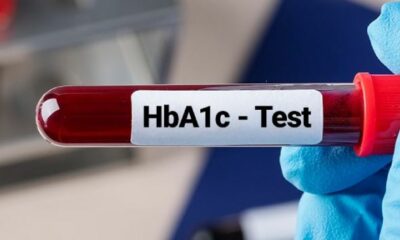The A1c test, often referred to as Hemoglobin A1c or HbA1c, plays a crucial role in diabetes management. This comprehensive guide unravels the mystery behind the A1c, empowering you to understand its significance and utilize it for optimal blood sugar control.
Understanding Hemoglobin and Glucose: The A1c Connection
The A1c test measures the percentage of hemoglobin, a protein in red blood cells, that is coated with sugar (glucose). Here’s a breakdown of the key players:
- Hemoglobin: This iron-rich protein in red blood cells carries oxygen throughout the body. Hemoglobin molecules have a long lifespan, typically lasting around 3 months.
- Glucose: The primary source of energy for your cells. It enters the bloodstream from the foods you eat and is transported by hemoglobin to fuel various bodily functions.
The A1c Test: A Window into Blood Sugar Control
When glucose circulates in the bloodstream, some of it attaches to hemoglobin molecules. The higher your blood sugar levels are on average, the more glucose will be bound to hemoglobin. The A1c test measures this percentage of glycated hemoglobin (hemoglobin with attached glucose).
Why is the A1c Test Important?
The A1c test offers a valuable snapshot of your average blood sugar control over a period of approximately 2-3 months. Unlike finger pricks, which provide a single point-in-time measurement, the A1c test reflects a broader picture of how well you’ve been managing your blood sugar.
Benefits of the A1c Test:
- Diagnosis of Diabetes: A high A1c level can be a crucial indicator of prediabetes or type 2 diabetes.
- Monitoring Blood Sugar Control: For individuals with diabetes, the A1c test is a key tool for monitoring the effectiveness of their diabetes management plan, including diet, exercise, and medication regimens.
- Identifying Trends: Tracking A1c results over time can help identify trends and adjust treatment strategies accordingly.
- Motivational Tool: Knowing your A1c level can serve as a motivator to stay on track with healthy lifestyle choices and medication adherence.
Interpreting Your A1c Results
The American Diabetes Association (ADA) recommends the following A1c targets for adults with diabetes:
- Below 7.0% – Indicates good blood sugar control.
- Between 7.0% and 8.0% – Indicates fair blood sugar control, but adjustments to your management plan might be necessary.
- Above 8.0% – Indicates poor blood sugar control, requiring significant modifications to your diabetes management plan.
It’s important to note that these are general guidelines, and your target A1c level may be adjusted by your doctor based on individual factors such as age, overall health, and duration of diabetes.
Factors Affecting A1c Levels
Several factors can influence your A1c results, including:
- Diet: A diet high in sugary or processed foods can lead to higher A1c levels.
- Exercise: Regular physical activity helps manage blood sugar levels, contributing to lower A1c results.
- Medications: Diabetes medications such as insulin or oral medications can significantly impact A1c levels.
- Illness: Certain illnesses can temporarily elevate blood sugar levels and affect A1c results.
- Stress: Chronic stress can raise blood sugar levels, potentially impacting A1c.
Understanding the Limitations of A1c
While the A1c test is a valuable tool, it has some limitations:
- Doesn’t Reflect Recent Changes: Since it measures average blood sugar control over 2-3 months, recent fluctuations in blood sugar levels won’t be reflected in the A1c result.
- Anemia or Blood Loss: Conditions like anemia or recent blood loss can affect A1c accuracy.
- Pregnancy: A1c levels are not a reliable indicator of blood sugar control during pregnancy.
A1c Testing Frequency: How Often Should You Get Tested?
The frequency of A1c testing depends on several factors, including:
- Type of Diabetes: Individuals with type 1 diabetes might require more frequent A1c testing than those with type 2 diabetes.
- Blood Sugar Control: Those struggling with blood sugar control might benefit from more frequent A1c testing.
- Treatment Plan: The frequency of testing may be adjusted based on the type of diabetes medications being used.
Discuss the appropriate A1c testing frequency with your doctor for personalized guidance.
Beyond A1c: Additional Blood Sugar Monitoring
The A1c test provides a valuable snapshot of average blood sugar control, but it doesn’t replace the need for other blood sugar monitoring techniques. Here’s why:
- Doesn’t Reflect Day-to-Day Fluctuations: The A1c doesn’t capture daily or even hourly variations in blood sugar levels. These fluctuations can be significant and require monitoring for optimal management.
- Importance of Self-Monitoring of Blood Glucose (SMBG): For individuals with diabetes, especially those using insulin, self-monitoring of blood glucose (SMBG) using finger pricks and a glucometer is crucial. SMBG allows for real-time blood sugar checks, enabling adjustments in diet, medication, or activity based on the results.
- Continuous Glucose Monitors (CGMs): These advanced devices offer a more comprehensive picture of blood sugar trends by providing real-time data and alerts throughout the day and night.
Combining A1c testing with SMBG or CGMs provides a more complete picture of blood sugar control, empowering individuals with diabetes to make informed decisions and achieve optimal management.
Working with Your Doctor: A Collaborative Approach
A1c testing is most beneficial when used in collaboration with your doctor. Here’s how:
- Discussing Results: Schedule follow-up appointments with your doctor to discuss your A1c results. Understand what the results mean in the context of your overall health and diabetes management plan.
- Adjusting Treatment Plans: Based on your A1c results, your doctor might recommend adjustments to your diet, exercise routine, or medication regimen to optimize blood sugar control.
- Addressing Concerns: Discuss any concerns you have about your A1c results or diabetes management with your doctor. They can offer guidance and support.
Living Well with Diabetes: A Multifaceted Approach
Effective diabetes management goes beyond just monitoring blood sugar levels. Here are some key strategies for living well with diabetes:
- Healthy Diet: Focus on a balanced diet rich in fruits, vegetables, whole grains, and lean protein. Limit sugary drinks, processed foods, and saturated fats.
- Regular Exercise: Aim for at least 150 minutes of moderate-intensity exercise or 75 minutes of vigorous exercise per week.
- Stress Management: Chronic stress can raise blood sugar levels. Practice relaxation techniques like deep breathing, meditation, or yoga to manage stress effectively.
- Healthy Sleep Habits: Prioritize good sleep hygiene for a restful night’s sleep. Adequate sleep is crucial for overall health and blood sugar control.
- Social Support: Build a strong support system of family, friends, or diabetes support groups. Social connection and emotional support can significantly improve your well-being.
Conclusion: Empowering Yourself with A1c Knowledge
Understanding the A1c test and its significance equips you to be an active participant in your diabetes management. By working collaboratively with your doctor, implementing healthy lifestyle changes, and utilizing various blood sugar monitoring tools, you can achieve optimal blood sugar control and live a fulfilling life with diabetes.
Disclaimer: This information is intended for general knowledge and should not be a substitute for professional medical advice. Always consult with your doctor to create a personalized diabetes management plan that includes appropriate A1c testing and blood sugar monitoring strategies.

 Diabetology2 weeks ago
Diabetology2 weeks ago
 Diabetology7 days ago
Diabetology7 days ago
 Diabetology5 days ago
Diabetology5 days ago
 Diabetology6 days ago
Diabetology6 days ago
 Diabetology6 days ago
Diabetology6 days ago
 Diabetology3 days ago
Diabetology3 days ago
 Diabetology3 days ago
Diabetology3 days ago
 Diabetology23 hours ago
Diabetology23 hours ago






